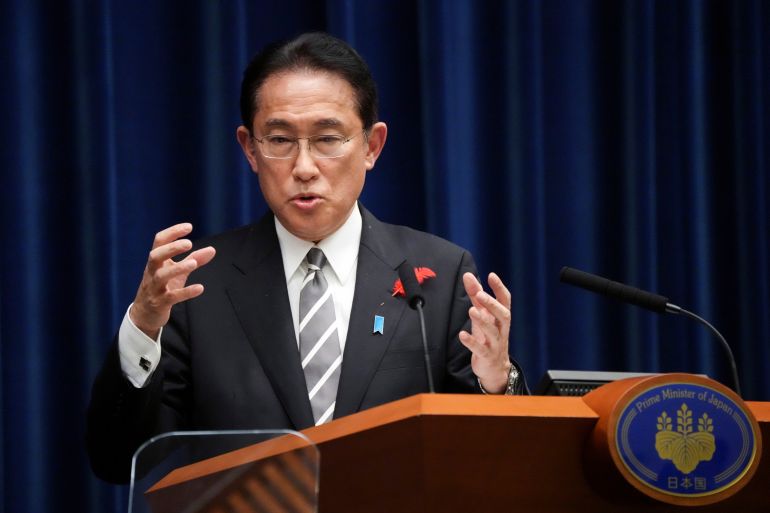One year in, Japanese PM’s ‘new capitalism’ faces old complaints
Japanese leader’s signature economic strategy has been criticised for lacking concrete details or targets.

Tokyo, Japan – When Japanese Prime Minister Fumio Kishida came to power in October last year, he pledged to foster a “new form of capitalism” that would spur healthy growth alongside a more equal distribution of wealth.
But as Kishida marks one year in office on Tuesday, the Japanese leader’s “new capitalism” is still struggling to get off the ground amid criticism that his signature strategy lacks concrete details or clear targets.
Keep reading
list of 4 itemsWill Israel and Lebanon resolve their maritime border dispute?
‘Dilemma for the Russians’ after surrendering key Ukraine city
Hurricane Ian death toll rises above 80, response criticised
Kishida’s struggles to turn his vision into a coherent economic plan capable of reversing decades of stagnation come as the world’s third-largest economy faces mounting challenges at home and overseas, from rising inflation and a weakening yen to global supply chain snags and the war in Ukraine.
Kishida, a former banker who positioned himself as the only post-war prime minister with experience in the finance industry, is widely seen as an awkward fit for the populist rhetoric he has championed.
“The key point is that Kishida has no strong personal convictions, particularly on economic policy,” Jesper Koll, an economist and executive director at Monex Group in Tokyo, told Al Jazeera,
“Setting up this ‘new capitalism’ slogan, and various teams around it, is effectively just a plan for business as usual.”
“There’s absolutely nothing new or radical in what [Kishida’s] proposed or in what’s going to be coming,” Koll added, describing the Japanese leader’s “steady hand” governance as in accordance with the incremental approach favoured by the ruling Liberal Democratic Party establishment.
The Prime Minister’s Office of Japan did not respond to Al Jazeera’s request for comment.

In an address at London’s Guildhall in May, Kishida spoke of capitalism’s “two major transformations”, from laissez-faire to the welfare state and from the welfare state to neoliberalism.
“In both of these transitions, the pendulum swung between two ideas: ‘market or state’, ‘public or private,’” he said. “But the next transition will be to a ‘new form of capitalism’, in which the public and private sectors work together.”
While stressing the need for a “virtuous cycle” of growth and wealth redistribution, Kishida has laid out policy in mostly broad terms, including investment in human capital, greater female participation in the workforce, funding for green initiatives, the digitalisation of government, and support for startups.
Tom Learmouth, who is undertaking doctoral studies on Japan’s economic history at the London School of Economics, said Kishida appeared to be aiming for a return to the industrial strategy of Japan’s post-war, high-growth era when the public and private sectors worked in close collaboration.
During this period of rapid economic growth, Tokyo actively tried to pick winners in industry by directing investment to sectors deemed to be promising, such as automobiles and electronics.
“Trying to resurrect that now, in a very different economic climate – where interest rates are close to zero – it’s difficult to see how the government can exercise much power over the private sector,” Learmouth told Al Jazeera.
Kishida, who criticised his predecessor Shinzo Abe’s “Abenomics” for exacerbating wealth inequality, did weigh concrete reform early in his tenure by proposing to raise Japan’s capital gains tax from the current rate of 20 percent. The Japanese leader, however, backpedalled within days after pushback from the business community and investors.
Eric J Ritter, a professor of economics at Lakeland University Japan, said Kishida’s redistribution agenda had failed to make headway.
“He had to give up on raising capital gains taxes on the rich which could’ve been spent on the poor,” Ritter told Al Jazeera. “Another issue is raising the tax ceiling on working wives who have to start paying tax if they earn above 1.1 million yen [$7,580] a year. This depresses family incomes and female participation.”
Ageing population
More recently, Kishida tried to spur, through corporate tax breaks, a rise in Japan’s long-stagnant wages, which have scarcely risen since the late 1990s and sit well below the OECD average. These efforts have also fallen short of expectations, with real wages continuing to fall as a result of rising import costs.
The plunging yen, which last month hit a 24-year low against the US dollar, has heaped more pressure on retailers and households, causing famously thrifty Japanese consumers to tighten their belts further.
Worse for the long-term health of the economy, Japan’s labour force is shrinking. After years of plunging birth rates, the country already has the world’s oldest population, with 28 percent of residents aged over 65. Japan’s labour market has also been criticised for lacking mobility, which is ranked about half of the OECD average.
Shigeto Nagai, head Japan economist at Oxford Economics, said labour market reforms and social security reforms that provide for the vulnerable working age population as well as the elderly should be key priorities of Kishida’s economic strategy.
“Rigid seniority-based wages under the lifetime employment system have undermined the dynamism of Japanese companies,” Nagai told Al Jazeera, describing the Japanese leader’s strategy so far as “very conceptual and confusing”.
“Making the labour market more flexible and dynamic will enable individual workers to earn more competitive wages reflecting productivity,” Nagai said. “It is [also] essential that the state takes responsibility for providing social security for the working-age population, rather than leaving it to the companies.”
NTT, Japan’s largest telecommunications company, recently announced plans to shift from seniority to performance-based promotion and compensation, raising hopes that corporate peers could be encouraged to follow suit.
While Kishida has struggled to initiate significant economic reform, some analysts say that simply keeping Japan’s economy steady during such a period of global turmoil would be an achievement in itself.
“This is a political world where it’s another day, another crisis,” Koll said. “Having a steady hand, which doesn’t rock the boat, but focuses on incremental changes – maybe that’s the right thing to do in the current environment.”